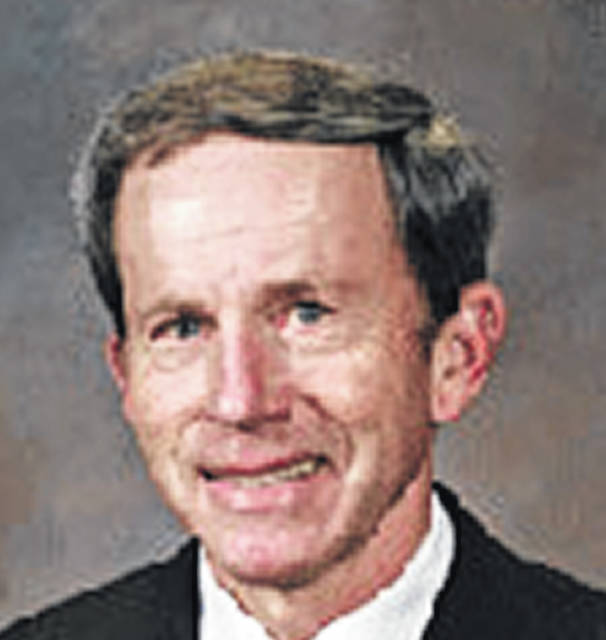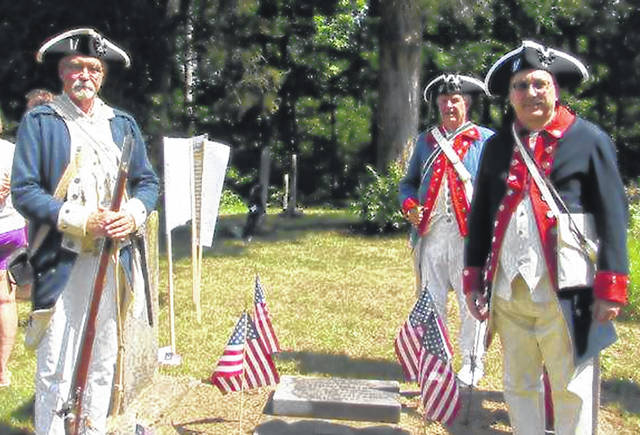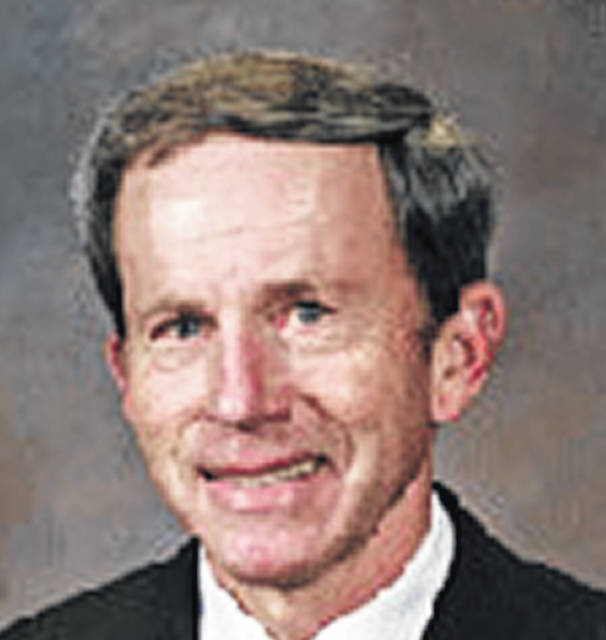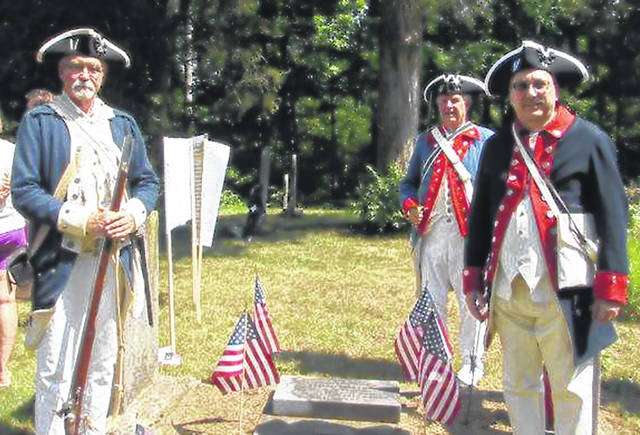



The Dec. 7, 2018, edition of the Sidney Daily News carried an article about the funeral of President George H.W. Bush and the front row seat two young Sidney men had for part of the proceedings. Pfc Jay Clark (SHS 2017) and Senior Airman Caleb Smith (SHS 2014) both had roles. Clark drove the bus carrying the Air Force honor guard to Arlington Cemetery. Smith served as a backup pall bearer.
These young men continued a grand Shelby County tradition of personal service to the presidents of this country dating back over 150 years.
Lewis Boyer, for whom the local chapter of the Daughters of the American Revolution is named, was a Shelby County resident who served in the Revolution with great distinction. He was a personal body guard for George Washington.
Doug Redd is a fifth generation descendant who lives in Florida. He has compiled over 500 pages of history on Boyer. “Lewis Boyer was in every major battle of the American Revolution, Redd stated at an event commemorating the 175th anniversary of his birth. Our first president referred to Boyer and the other guards as “My guards.” They were a highly trained unit, “equivalent to any of the fighting forces in Europe,” according to Redd.
Redd was in Shelby County earlier this year for the anniversary ceremony. It was held in Wesley Cemetery off Brown Road in Orange Township. Boyer was remembered as an authentic war hero. Redd recalled “He was one of the last 12 bodyguards which accompanied Washington back to Mount Vernon after the war.”
Jonathan Lewis enlisted with the 147th Ohio during the Civil War. He was just 15 years old. His unit was sent to Washington- Washington City, as it was known then. For reasons history unfortunately does not record, Lewis was given special orders. He was going to guard the president!
He served with Company K of the 150th Pennsylvania, which was the main group charged with the responsibility of Lincoln’s safety. The 15 year old Lewis’s main duty was to guard the well on the White House grounds. As Lewis would remember after the war, the President stopped daily for a drink of the cold water. He usually spoke to Lewis, but the frightened young man only remembered one thing Lincoln told him. One day President Lincoln stopped, paused, and told Lewis, “Son, you are too young to be a soldier.”
Quaking in his boots, Lewis feared he would be reported and drummed out of the service. However, the kindly President kept his observation to himself. He received a presidential proclamation signed by Lincoln himself at the end of his duty. It was his most prized possession.
Jonathan Lewis returned to Plattsville after the war. He was a farmer and patent medicine man.
Shelby County resident John Rhodes also had special stories to tell after World War I. Most of them involved experiences he would have rather forgotten. He was gassed twice- once losing his eyesight for 8 days and the other time losing all his hair. The soldier was wounded when a bullet passed between two of his fingers, burning his skin. The gas, however, had lasting effects. He was totally disabled from damage to his lungs caused by the gas.
Rhodes vividly remembered his highlight of the war. It involved a visit to the front by President Woodrow Wilson. His unit, the 103rd Infantry, was assigned guard duty. Rhodes recalled most of the men were sick from dysentery. “I was one of the lucky ones. There were eight or ten of us who didn’t get it.” These lucky men were assigned to protect the President.
“There were four soldiers on each side of the jeep. I got to walk right alongside him,” Rhodes recalled. “He was very friendly and talked to the generals and us.” They accompanied President Wilson for three miles before another unit took over.
Rhodes’ luck finally ran out. Five hours after his time with the Wilson ended, he came down with dysentery.
Hugh Weiskittle had the unique honor of guarding two presidents. The 1942 Holy Angels graduate enlisted in the Marines. After completing some schooling, he was eventually assigned to the staff of Admiral Ernest King. He was the only person ever to serve both as the Commander in Chief of the U.S.
Fleet and the Chief of Naval Operations simultaneously. Weiskittle recalled, “Admiral King was a fine man who loved his Marines.”
He was on King’s staff when President Roosevelt died. Sgt. Weiskittle was assigned to guard duty during the time Roosevelt laid in state in the rotunda of the Capitol. “I was one of only 17 Marines involved,” he said. “We stood two and a half hour shifts. There was one guard at each corner of his casket. It was a hell of a lot of responsibility.” Roosevelt lay in state for two days. Weiskittle remembered, “Thousands of people filed by the casket. It was 24 hours a day.”
Weiskittle also had the honor of guarding President Truman when he visited Admiral King on his flag ship. He led a detachment of 14 Marines. “I was very nervous about that,” Weiskittle recalled. “I opened the door for him, and said ‘Good night, Mr. President.’ and he replied, ‘Good night, Sarge.’”
The great Sidney tradition of guarding presidents continued with Roger Strunk. Strunk “dropped out of Sidney High School in the 11th grade in1969 to join the Marines” he told Patricia Speelman of the Sidney Daily News in a 2014 story. “I wanted to be the best of the best and wanted to go to Vietnam so my friends who didn’t want to go didn’t have to go,” he added. Strunk served three tours of duty in Vietnam.
The Marine was an MP, or a member of the military police. It was while serving in this capacity at a Marine air base in El Toro, California, he met President Nixon. Strunk and his fellow Marines provided sniper services on the base and also took turns riding with President Nixon on his helicopter, Marine One.
“It was very strict. You could not speak to him unless he spoke first. The President did ask me about my sisters. We talked about fishing and hunting- normal stuff.”
Stunk recalled the Secret Service agents with the President were always “playing tricks on us and testing us. They planted an artificial bomb on the runway once and our guys found it.”
Nixon gave Strunk a hand-written note thanking him for his service. “He was a good guy. I would have taken a bullet for him. I am glad I served and would do it again.”



